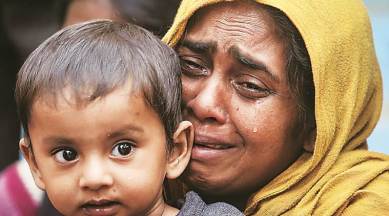Stay updated with the latest - Click here to follow us on Instagram
‘Genocidal intent can’t be the only hypothesis in Rohingya case’: Myanmar’s Aung Suu Kyi
On Tuesday, Suu Kyi listened impassively as lawyers for Gambia detailed graphic testimony of suffering of Rohingya at the hands of the Myanmar military.

Facing accusation of genocide committed by her country, Myanmar’s civilian leader and Nobel Peace laureate Aung San Suu Kyi told the International Court of Justice at The Hague that allegations that the Buddhist-majority country had committed genocide against Rohingya Muslims were “misleading and incomplete”, reported AFP.
“Regrettably The Gambia has placed before the court a misleading and incomplete picture of the situation in Rakhine state,” Suu Kyi said of the case brought by the African state at the International Court of Justice.
Explained: Why Nobel Laureate Aung San Suu Kyi is in The Hague, defending Myanmar
The Nobel prize laureate, who was leading Myanmar’s defence herself at the court, acknowledged that disproportionate force may have been used at times by the military, but said the conflict in the western Rakhine state was “complex and not easy to fathom”.
Ever since the military launched a crackdown in western Rakhine in August 2017, more than 730,000 Rohingya fled Myanmar to live in crowded refugee camps in Bangladesh. Myanmar maintains that the military operations in Rakhine were a justifiable response to acts of terrorism and that its soldiers have acted appropriately.
On Tuesday, Suu Kyi listened impassively as lawyers for Gambia detailed graphic testimony of suffering of Rohingya at the hands of the Myanmar military.
Although a United Nations fact-finding mission found that “the gravest crimes under international law” had been committed in Myanmar and called for genocide trials, no court has weighed evidence and established a genocide in Myanmar.
(With inputs from AFP)